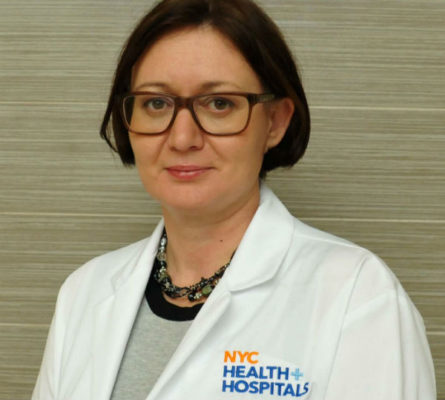 World AIDS Day, is celebrated annually on December 1st, it recognizes advancements in the global fight against HIV/AIDS, honors those who lost their lives to the virus, and serves as a reminder to prioritize sexual health by getting an HIV test. NYC Health + Hospitals, the largest public health care system in the nation, makes getting an HIV test fast, easy, and confidential. Tests are available at little or no cost at all public hospitals and NYC Health + Hospitals/Gotham Health centers from Harlem to Hollis, Queens.
World AIDS Day, is celebrated annually on December 1st, it recognizes advancements in the global fight against HIV/AIDS, honors those who lost their lives to the virus, and serves as a reminder to prioritize sexual health by getting an HIV test. NYC Health + Hospitals, the largest public health care system in the nation, makes getting an HIV test fast, easy, and confidential. Tests are available at little or no cost at all public hospitals and NYC Health + Hospitals/Gotham Health centers from Harlem to Hollis, Queens.
For years regular HIV screenings along with consistent condom use have been critical tools in the fight against HIV. Today, PrEP is another important new tool to protect HIV-negative people who are at risk for infection. To address frequently asked questions about PrEP, Dr. Simona Bratu, medical director of NYC Health +Hospitals/Harlem’s Infectious Disease/HIV Clinic was asked about PrEP.
What is PrEP? Who should take it?
Dr. Simona Bratu: PrEP, which is short for “pre-exposure prophylaxis,” is a daily prevention method that can help HIV-negative people reduce the risk of infection. A combination of two HIV medicines taken daily, PrEP is highly effective in preventing HIV when used as prescribed. PrEP may be right for men, women, and transgender people who are at risk for HIV–through sex and/or the use of injectable drugs–and are comfortable taking a daily pill to prevent infection.
If someone has been exposed to HIV. Should they ask their health care provider for PrEP?
Dr. Simona Bratu: No. PrEP is preventive medicine for use by people who are at risk for HIV infection over time. If you may have been exposed already, you should ask your doctor about post-exposure prophylaxis, or PEP for short. PEP helps prevent HIV infection after a possible exposure. A course of treatment should be started within 72 hours after exposure and continued for 28 days. In some cases PEP patients are excellent candidates for PrEP once they finish the 28-day course of treatment.
Why are there more new tools to prevent HIV? Aren’t condoms enough?
Dr. Simona Bratu: Condoms are an important and effective tool in the fight against HIV, but for various reasons, some people are going to have challenges with condom use. And condoms can break. PrEP works as a shield that helps to empower HIV-negative people with another option to avoid infection. When used correctly, PrEP has been proven to be effective in reducing the risk of HIV infection. Understand, though, it does not protect against sexually transmitted infections, like gonorrhea, chlamydia, and syphilis, and it is not birth control.
Once someone starts taking PrEP, do they have to use it for the rest of their life?
Dr. Simona Bratu: No. If you no longer believe the protection PrEP offers is right for you, talk to your health care provider about discontinuing PreP. If things change and you enter another period of life where you again believe you are at risk for HIV infection, you can restart PrEP treatment at that time.
To find an HIV test center in Harlem click HERE.
Become a Harlem Insider!
By submitting this form, you are consenting to receive marketing emails from: . You can revoke your consent to receive emails at any time by using the SafeUnsubscribe® link, found at the bottom of every email. Emails are serviced by Constant Contact








